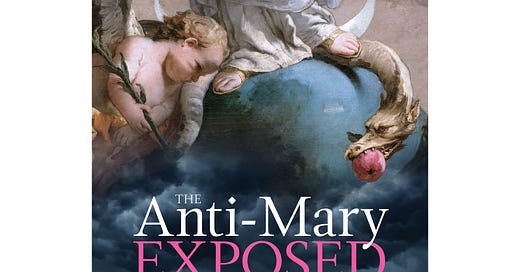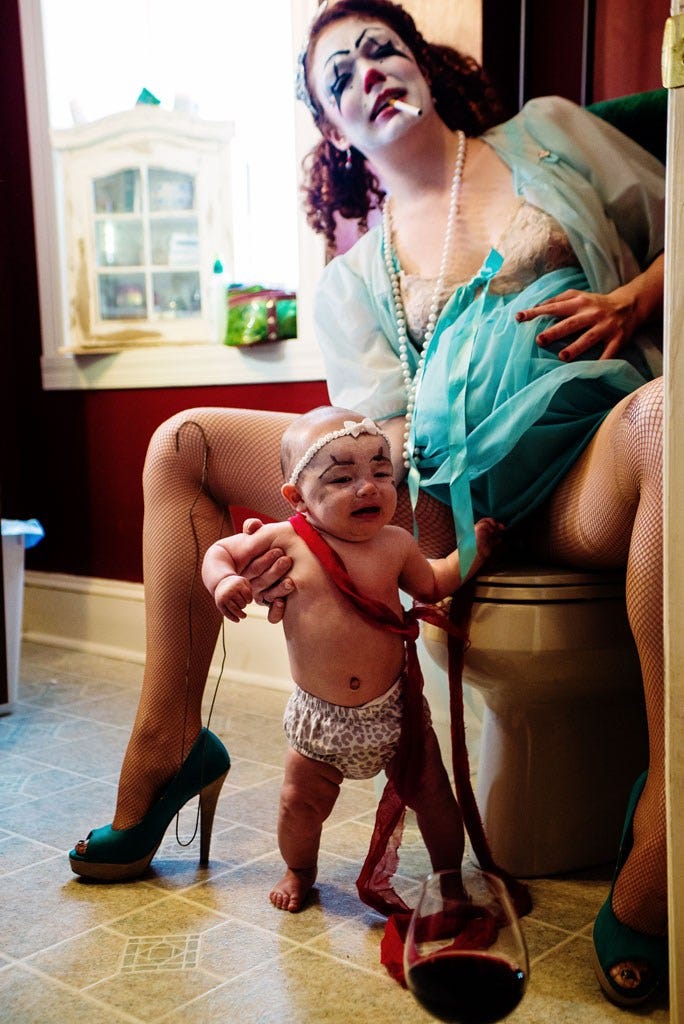Feminism's War on Femininity
You thought "toxic masculinity" was a thing and really, really bad? A recent book by author Carrie Gress highlights how much worse "toxic femininity" actually is.
“The worst form of inequality is to try to make unequal things equal.”—Aristotle
It wasn't supposed to be like this. I had a completely different tack set out for this week's voyage. However, as Proverbs 16:9 says, “In their hearts humans plan their course, but the Lord establishes their steps.”
So when I was getting ready to map out the writing for this piece, I was surprised when I was inspired by the Holy Spirit to do a book report instead of the expose on the universally confounding confluence between the news and entertainment industries I had in mind, which will now be preempted until next week.
Some time over the last year, I encountered Carrie Gress' The Anti-Mary Exposed: Rescuing the Culture from Toxic Femininity, was enthralled by it, and took the copious notes which I “just happened” to have unexpectedly come across after finishing last week's piece, “Feminism’s War on Masculinity.”
And those of us who are believers know nothing with the Holy Spirit “just happens,” because it was after having come across my notes that I was led to consider how turning this Substack's readers' attention to Gress' work provides the perfect complement to my previous exposition on the social and spiritual vagaries associated with radical feminist-supremacism's manipulation of the “toxic masculinity” myth to further its own narcissistic and misanthropic, anti-social, dystopian agenda.
A Catholic Christian, Carrie Gress is a Fellow at The Ethics and Public Policy Center and a Scholar at The Institute for Human Ecology at Catholic University of America. Other of her published titles include The Marian Option and Theology of Home with co-author Noelle Mering.
If her Catholicism may tend to turn you off, don't let it. Although Gress' writing is unmistakably (and to her credit) informed by her Christian spirituality, her identification as a Catholic by no means limits the validity of her well-argued work, nor does it taint it with any sectarian bias. The work doesn't preach, it informs. It's a valid sociopolitical and spiritual treatise that can easily stand on its own merits without any sectarian support upon which to rely. At no time while reading the book did I ever think, “This is just too Catholic (or even too preachingly Christian at all) for me!”
Gress' exploration and exposure of the phenomenon of “toxic femininity” demonstrates precisely one of my contentions from the previous article: that just as there's no such naturally-occurring thing as “toxic masculinity,” what she refers to as “toxic femininity” is also merely the parallel, feminine version–of its masculine counterpart–mirroring the toxicity inherent not in femininity (or masculinity) itself, but in its manifestation as a stunted, not-completely-developed, arrested, juvenile-delinquent form of femininity (or masculinity) which derives from its corruption and perversion by the radical feminist-supremacist agenda.
As a Christian believer, I'm personally convinced of the relationship between man and woman as set out by God and explained in Holy Scripture. When we're told God created man in his own (spiritual) image, we're also told in Genesis 1:27 that he created the being “Man” as male and female. The word “Woman”, Genesis 2:23 says, was how Adam called the mate and helper given to him by God, which essentially means “taken out of man.”
So spiritually, we as men and women are equal before God because we're both made in the spiritual image of God. That we're different physically is undeniable (except to the most radically-detached from reality). That we're different by our attributes is what gives each of us our masculinity and femininity; and those attributes are merely the characteristics God gave each of us to define our functionality as well as our relationship to one another.
They don't–and were never intended to–define value, validity, and certainly not superiority of either one over the other.
They were intended to give each of us–men and women–the qualities most suited to our respective natures; qualities that complement one another perfectly, so that our cooperative endeavor of getting through this world can succeed as we work together in it.
What one of us has in abundance, makes up for the lack of it in the other. What each of us lacks, is compensated for by a corresponding surplus in the other. God made it that way not so that we would fight one another to determine superiority, but so that we could work together in balance and harmony with each other as we build relationships, families, communities, nations, cultures and societies.
At least, that was the plan.
However–Gress' thesis explains–starting in the 1960's, radical feminists, warming up to a full head of steam over the prior hundred or so years, began openly and furiously agitating for what they'd already been covertly promoting for decades before that through political, social and cultural means.
Their effort centered on convincing millions of women that rethinking the millennia-old relationship between mother and child is necessary for women to break free of the shackles binding them in an oppressive paradigm that stands in the way of their freedom, happiness and the realization of their full potential.
This seductive, narcissistic, navel-gazing re-imagination of the nature of womanhood has led to a systemically-reinforced, systematic breakdown of the family unit; which in turn has led to a breakdown of the balanced, harmonious, productive and creative functionality of the communities, cultures and societies based on the family as a model for thousands of years.
Gress' contention (with which I happen to agree), is that this is part of the spiritual conflict being played out right before our eyes and whose nature and dynamics are abundantly described in Holy Scripture. In essence, she describes the radical feminist agenda as the manifestation of a universal spirit she defines as the “Anti-Mary,” along the lines of the Jezebel spirit the Lord Jesus refers to in his letter to the church at Thyatira in the second chapter of the Book of Revelation.
Gress proposes the archetypal antidote to the Anti-Mary–to her universal spirit as well as to the social and spiritual carnage that spirit has wrought on the world and humanity over the last three-thousand years or so–is Mary, the mother of Jesus; not simply by virtue of her having been the physical vessel through which the earthly incarnation of God was born into the world, but because what we know of her and her character makes her a high-profile, shining example in perpetuity of the kind of godly womanhood with the kind of attributes the Creator intended. Joining ranks with such women as Miriam, Esther, Ruth and Rahab, she's distinguished from them only by the fact that she's as much the most prominent example of godly womanhood in the New Covenant-spiritual sense, as they were of that of the Old Testament.
And by the fact the child she bore into the world happens to be the only human in history to bear the full presence and power of God's Holy Spirit, because as the Son of Man, he’s also the Son of God.
And so, what Carrie Gress has to say about the spiritual, social, mental, emotional and physical destructiveness of “toxic femininity” provides the perfect flip-side to the coin I set spinning on the table in my article last week. And rather than me bloviate about what she has to say about it, I thought it would be a good idea to simply let some of her own words speak as eloquently and insightfully as they do for themselves…
“The woman of folly inflicts gross spiritual and physical damage. Her toxicity spreads like a cancer on a soul and society. She is manipulative, deceitful, deceptive, seductive, and narcissistic. She quietly destroys others with a smile on her face and nary a prick to her conscience. She teaches others to do the same, enthralling and entrapping them with her beauty, her aloof sophistication, and her faux kindness."
“A richer description of the manipulation of a Jezebel spirit includes confusion, intimidation, draining the opposition through argumentation, refusing facts, changing the subject when proven wrong, blaming others for her faults, use of pseudo-friendships to acquire favors and accrue power, and eventually conquering the opposition through destruction or betrayal.”
“Demons, in general, do not have the capacity to influence the wider culture if people are not first complicit in sin. For these anti-Marian spirits to gain a foothold in the culture, men and women had to open the door through their own sinfulness, stepping outside of the state of grace, which allowed the demonic to enter into a soul in one form or another. Fr. Ripperger reports, 'I tend to find that various demons tend to use the disorders of Original Sin that are proper to women, for example, the desire for self-sufficiency separate from one's own husband, the desire to control, the fear of being hurt, etc...'”
“The bad mother is the one who controls those she is given power over. She manipulates her children, leaving them in a state of dependency so that she is always in control and they are locked in an infantile or undeveloped state.”
“What we may not realize, however, is that the marketplace of ideas works like the fashion industry. Instead of elite designers, the political and social elite—the matriarchy who are beholden to anti-Marian ideas—provide the parameters about what we think. Instead of skirt lengths and eye shadow hues, they suggest intellectual trends that we scarcely know are being dictated to us through every possible avenue, from women's magazines to popular daytime television and, especially, mainstream media.”
“Just like the proletariat, the generic word women, Legutko explains, 'is an abstract concept that does not denote any actual existing community, but only an imagined collective made an object of political worship among feminist organizations and their allies.' He continues: 'But the paradox is that this feminist woman, being a figment of political imagination, is considered by feminists to be a proper woman, a woman in a strict sense, the truest woman, just as for the communists the Marxist proletariat was the truest representative of the working class. By the same token a real woman living in a real society, like a real worker living in a real society, is politically not to be trusted because she deviates too much from the political model. In fact, a non-feminist woman is not a woman at all, just as a noncommunist worker is not really a proletarian.' The non-woman, therefore, must be denied a voice so that she cannot do damage to the ideological bulwark holding up the effort.'”
“Any of the intellectual pillars that once held feminism aloft have been reduced to arguments based on emotions, bullying, mockery, or childish tantrums.”
“A woman under the spell of her own will is unable to see clearly the will of the Father, or of her husband, or her children, resulting in the upheaval we see in our own culture, and it is particularly children who are on the chopping block in sacrifice to the will of the mother.”
“Parents are the bridge between a child and God; they are the first icon of His unconditional love.”
“We have to remind women that radical feminism isn't who they really are. Striving to be like men isn't who they really are. Being consumed by rage, anxiety and malice isn't who they really are. And living as if there is no God isn't who they really are.”
Amen, sister.
You can follow Gene Kaye and Kentucky Fried Christian on Faith Social, Gettr and Truth Social. Check out the Videograms of Verse video series on the KFCh channel on Rumble. Please consider becoming a paid subscriber to help support Gene Kaye’s work and to get exclusive access to the serialization of Living With Caligula, an anthology of short-fiction tales of the earliest Christian believers, available only on this Substack.






